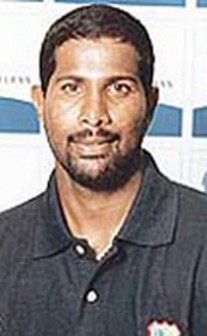As the West Indies Players Association (WIPA) and the West Indies Cricket Board (WICB) sat around the conference of the Caribbean Court of Justice (CCJ) in Port-of-Spain yesterday, WIPA president Dinanath Ramnarine made it clear that with no Collective Bargaining Agreement (CBA) cricket will be crippled in the Caribbean.
Ramnarine made the remark during his opening statement as both teams met to revise the existing CBA.
Representing WIPA on the opening day were attorney Dave Kissoon and WIPA president and CEO Ramnarine. WIPA director Michael Hall, who was carded to be at the meeting could not make an appearance because of an emergency he had to attend.
Leading the WICB’s team was CEO Ernest Hillaire along with consultant Gerard Pinard and attorney Alana Medford.
Ramnarine outlined that in 2005 the then president of the WICB Rev Wes Hall saw it fit to have a CBA in place in order to negotiate with one body representing the players.

“Reverend Hall and his board were so certain that the process was the best for West Indies Cricket that they sought to ensure that no future President, CEO or Board could unilaterally change or repudiate the agreement. They also wanted to avoid any lock-outs like the one that the players of the National Football League of the US just experienced and the one that is now confronting the NBA players.
“They face a one-year lockout. Had it not been for Reverend Hall’s foresight, this could have happened to all West Indies players at midnight on September 30, 2008. Fortunately this did not happen and, hopefully, will not happen again.”
Ramnarine added: “The WICB has indicated that it plans to end the agreement unilaterally. If this happens or if there is no continuity clause, we could be forced to come up with our own system that we think complies with the applicable laws, knowing that each and every aspect of it is potentially the subject of years of litigation and uncertainty. The effect of no CBA would not be great for the players, teams, or, most importantly, fans.
“We will be shortly discussing proposals from the WICB which challenge the philosophy on which the present agreement is based. These proposals also challenge the principles of equity and justice which characterise the present agreement. However, this is a bargaining or negotiating session and we respect the process and expect that the lines of disagreement will eventually converge. That is why we are here. As we did when we met with Reverend Hall and his team, we will present our position and rationale on every issue and we hope that the WICB will do the same.”
The time line set for the end of the negotiations is September 30 and Ramnarine was quick to point out that it may take longer than that period. “At the outset let me say that we don’t expect negotiations to be completed by September 30, 2011. It took almost three years to get the present agreement in place and despite the radical changes the WICB has placed on the table, the negotiations cannot be completed in two months. The WICB has to be willing to go back to the spirit of cooperation and partnership that guided the creation of the present CBA.
“I believe that both the Board and WIPA – all of us, together – must recognise our shared responsibility as stewards of the game to compromise and reach a fair agreement – one that fairly compensates players, protects their health and safety, ensures the on-field competitiveness of the West Indies Cricket team, helps retired players and improves the fan experience and fan value. The best way to get there is to let each side exercise its rights under the agreement and within existing labour laws.”




